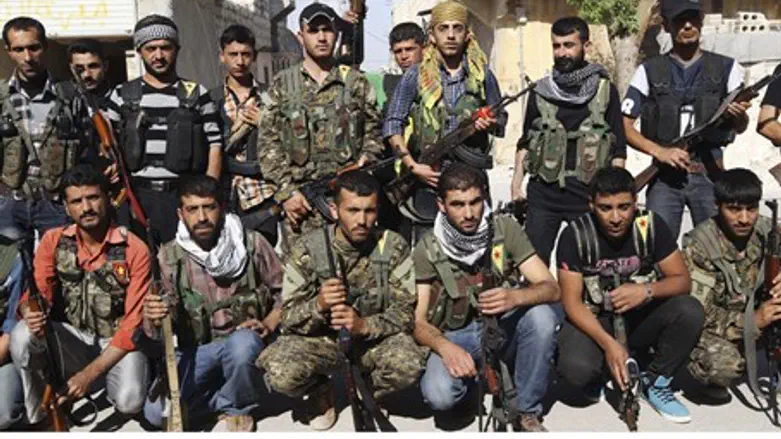
Syrian opposition hails EU Hizbullah ban
Syria's mainly Sunni opposition is celebrating yesterday's decision by the EU to blacklist the "military wing" of the Shia Islamist group Hizbullah as a terrorist organisation, Lebanon's NOW news agency reported.
The Syrian National Coalition declared that the ban was "a step in the right direction and highlights the need for the European Union to take measures to stop [the] militia from intervening in Syria," and called for "Hizbullah officials to be brought to justice for the terrorist crimes they committed on Syrian soil".
"The free world must take preventive measures against Hezbollah's leaders, members and supporters, who participated in the spilling of Syrian blood," the statement added.
Hizbullah - based in Lebanon - is backed by both Iran and the Syrian regime of Bashar el-Assad, and has played an increasingly important role in recapturing rebel-held areas, though at considerable cost to its own manpower.
Israel and other western states, including Great Britain, have long urged sanctions against the group for a long string of terrorist atrocities, but it was apparently the groups intervention in Syria which finally cost it dearly, convincing EU member-states who were previously against a ban to change their minds.
The ban may only have gone "halfway" by excluding Hizbullah's "political wing", to quote Avigdor Lieberman, but it will mean significant restrictions on the group's activity in one of its most important pools of fundraising - including denying visas to key individuals and freezing assets across the continent. Hizbullah's Secretary General, Hassan Nasrallah, has himself previously remarked that a European ban would "destroy" the group because 'the sources of our funding will dry up and the sources of moral, political and material support will be destroyed."
The Assad regime, meanwhile, condemned the move.
In a statement, the Syrian Foreign Minister declared,
"Syria strongly condemns this decision and the powers that are behind it because it targets the present and future of the Arab nation... and serves Israel's plans in the region."
Kurdish rebels drive Sunni jihadis from villages
Also on Tuesday, AFP reported that Kurdish groups made rapid advances in northern Syria, expelling Sunni jihadists from several villages.
Tuesday's fighting hit several villages including Yabseh, Kandal and Jalbeh, which lie in the northern province of Raqa on Syria's border with Turkey and are home to a mixture of ethnic and religious communities, said the Syrian Observatory for Human Rights.
It also reported that the Kurds expelled the jihadists from Kur Hassu, Atwan, Sarej and Khirbet Alu villages in the same area, which lies near the majority Kurdish town of Cobany.
In Hasake to the east, Kurdish-jihadist fighting went into the seventh consecutive day in the Jal Agha area and other villages in the majority Kurdish province, the Observatory added.
The latest battles come a week after fighters loyal to the Committees for the Protection of the Kurdish People (YPG) expelled the jihadist Al-Nusra Front and the Islamic State of Iraq and the Levant (ISIS) from the strategic Kurdish town of Ras al-Ain in Hasake province.
Ever since, fighting has spread from Hasakeh in northeastern Syria to several hotspots in Raqa province in the north.
At least 70, most of them jihadists, have been killed in eight consecutive days of Kurdish-jihadist fighting, said the Observatory.
"What we are seeing is the spreading of fighting between Kurds and jihadists westwards, across areas that are home to both Arab and Kurdish communities," Observatory director Rami Abdel Rahman told AFP.
Though the fighting is between jihadists and organised Kurdish forces, there is "a growing gulf between Kurdish and Arab residents of these areas," Abdel Rahman said.
"The battle is morphing from a fight between the YPG and the jihadists to a struggle between Kurds and Arabs as a whole."
Prior to the outbreak of the 2011 revolt against President Bashar al-Assad's rule, the Kurds suffered for decades from marginalisation and oppression at the hands of the Syrian Arab regime.
When the revolt erupted, one of the first measures taken by Assad was to grant the Syrian nationality to Kurds who had up until then been deprived of this right.
Then, starting mid-2012, Assad's forces withdrew from Kurdish regions which now are run by local Kurdish councils.
The Kurds, who represent about 15 percent of the Syrian population, have since walked a fine line, trying to avoid antagonising either the regime or the rebels.
But as abuses by jihadist groups in areas that have fallen out of Assad's control mounted, the Kurds announced they would seek a temporary autonomous state and establish a constitution.
The speedy developments have brought to the surface a deep-seated mistrust that has been heightened by the Syrian opposition's failure to adequately represent Kurdish groups, activists say.
"There hasn't been real trust at the political level since the start" of the revolt, Syrian Kurdish activist Havidar told AFP via the Internet.
"We (Kurds) all stood by the revolution but unfortunately the Syrian opposition... has played games with the Kurds... and marginalised them," Havidar said.
As a consequence, "there is a very obvious divide now" between Kurds and Arabs, he said.
The Kurdish people are the largest nation without an independent state in the Middle East. There ancestral homeland is currently occupied by Iran, Turkey, Iraq and Syria, although the Kurdish populations in the latter two states are enjoying increasing levels of autonomy.
